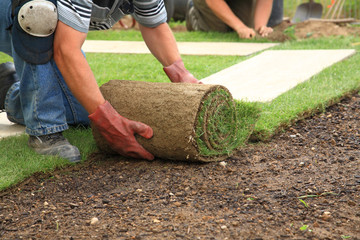Landscapers provide various outdoor services, including lawn mowing, shrub trimming, tree pruning, water feature installation, and garden maintenance. They operate powered equipment like mowers, tractors, and leaf blowers.
They can work at conservation sites, historic homes, and state parks as well as providing door-to-door service to residential areas. Contact Landscapers Baltimore for professional help.
Landscapers are responsible for horticultural tasks such as landscaping and maintaining lawns, gardens and other outdoor spaces. Their duties include trimming, mowing, pruning and mulching greenery; removing weeds and dead plants; and providing plant nourishment through fertilization and watering. They also decorate outdoor areas by placing statues, rocks and other lawn ornaments. Depending on the scope of their work, they may be required to install irrigation systems and lighting fixtures. They can be supervised by a landscape architect, garden designer or general manager.
Working in the landscaping industry can be physically demanding, especially if the work is manual. It is important for the physical health of these workers to maintain good balance and posture, and to wear appropriate clothing and footwear to prevent heat-related illnesses. In addition, this type of work can lead to injuries from tripping, falling, or accidentally stepping on sharp objects. It is important for landscapers to take breaks during the workday.
Many people choose to become a landscaper because they enjoy working outside and with their hands. It is a very active job that provides good exercise and builds strong bones and muscles. This type of activity can help reduce the risk of heart disease, regulate insulin and glucose levels, and improve balance and coordination. It can also promote mental health by reducing stress, depression, and anxiety. It can even enhance cognitive function and creativity by increasing oxygen levels in the brain.
Landscapers must have a good understanding of how to operate a variety of tools and machinery, including mowers, trimmers, pruners, hedgers, and chainsaws. They also need to have a strong attention to detail to ensure accurate measurements and immaculate finishing touches. Having these skills can make the job more enjoyable and increase productivity.
It is important for landscapers to take care of their mental health as well. Getting enough sleep, eating healthy food and spending time doing activities that you enjoy away from work can all have positive effects on your life. It is also a good idea to find a support group to talk to when you need it. There are several online communities that have been set up specifically for this purpose, such as Lawncare Legends.
Education Requirements
There are a number of different pathways to becoming a landscaper. Some people start their careers right out of high school, while others may choose to go to college to learn more about the industry. It’s also possible to get into the industry through an apprenticeship or by working with a landscaping company in a non-skilled role, and then working your way up. Many people who work in the industry find that it is extremely rewarding and satisfying, particularly when they see a property transform as a result of their hard work.
A high school diploma is necessary for most positions in the field, though some specialized roles may require additional education. High schools with career and vocational programs often offer courses in horticulture, plant science, gardening and landscape design. Many two- and four-year colleges also offer degree programs that focus on these subjects, and include business and management classes to prepare students for leadership roles in the industry.
If your job involves the use of pesticides or other agricultural chemicals, you’ll need to have a commercial applicator license in your state. Some landscapers also need to have safety certification for equipment such as chainsaws. Some states require a special license to operate certain types of equipment or to provide specific services, such as septic system installation, soil testing, hydro mulching, or tree trimming and removal.
Some employers will require you to have a special license or permit to operate on their property. This is especially true for if the work you do requires the use of dangerous equipment or chemicals. It’s important to ask your employer if any special requirements apply before beginning a new project.
Many landscaping professionals enjoy flexible and sociable working hours, and the opportunity to work outdoors. However, the job is physically intensive and can be hazardous. It’s therefore important to be physically fit and have a good level of manual dexterity. It’s also a good idea to invest in some personal protective equipment such as a hard hat, eye protection and gloves. Landscapers also need to have a good understanding of how to use and maintain machinery such as lawn mowers, tractors and power tools.
Working Conditions
A landscaper works outside and must be able to work in all types of weather. The work is physically demanding and requires bending, kneeling, lifting, moving heavy objects, mowing, trimming, planting, watering, grading, fertilizing, mulching, pruning, laying sod and using small equipment. Landscapers also spend time designing landscaping and advising customers.
A Landscaper can be self-employed or employed by a company that specializes in commercial landscaping, residential landscaping or both. In the commercial setting, they may work on outdoor areas of office buildings, shopping malls and hotels or motels. In addition to lawn maintenance, they might be responsible for installing landscaping features like walkways or patios or irrigation systems.
Landscaping workers often use hand tools as well as power equipment such as mowers, lawn tractors and hedge trimmers. For more elaborate projects or larger properties, a landscaper might employ backhoes and bulldozers.
One of the biggest challenges facing landscapers is the potential for exposure to hazardous chemicals in the workplace. The Canadian Centre for Occupational Health and Safety notes that the chemicals used in landscaping can enter the body through the mouth, eyes or skin as well as be inhaled into the lungs. Long pants, sturdy shoes, gloves and eye protection are recommended to reduce the risk of exposure to these chemicals.
Other potential hazards include overexposure to sunlight, which can cause heat stress and raise the risk for developing skin cancer. For this reason, landscapers should always use sunscreen when working outdoors and follow the Fund’s Sun Sense Plus guidelines to prevent overexposure.
Landscapers also need to be competent with operating small equipment, such as lawnmowers, hedge trimmers and chainsaws. They also need to be familiar with basic tech tasks and software to streamline their daily operations.
Landscapers need to have excellent attention to detail to ensure they are able to plan, design and execute their projects properly. This skill is particularly important when it comes to executing more complex landscaping plans, which may involve multiple plant species and intricate details. For example, a landscaper might need to accurately measure the length and width of a tree or hedge in order to determine how much material is needed for an installation project.
Salary
The salary of a landscaper varies depending on their job duties, education level, and experience. Those with higher level degrees or industry-focused education can earn more than those without these qualifications. It is also possible for a landscaper to increase their income by making a career move or by working for a landscaping company that pays well.
A good way to boost a landscaping business is to pay a competitive salary and provide a generous benefit package to employees. This will help attract and retain qualified staff, allowing the business to deliver a better service to customers. In addition, it will save time and money on hiring and training new employees. It is also important to understand the financial challenges of a landscape business and plan accordingly. A good way to do this is by creating a spreadsheet that shows the total revenue, expenses and net profit for each month of the fiscal year. This will give the owner a clear picture of his financial position and enable him to make decisions regarding salaries and wages for his employees.
While many people believe that the landscaping industry doesn’t pay well, this isn’t true. In fact, the industry’s operating profit margins are around 10% to 50%. This is due to the high demand for landscaping services from residential and commercial property owners, as well as the low labor costs in this industry.
There are many ways to increase your salary as a Landscaper. These include obtaining a higher degree or taking on more responsibility. Another way to increase your salary is to market your skills and experience. This can help you find new customers and earn more money.
